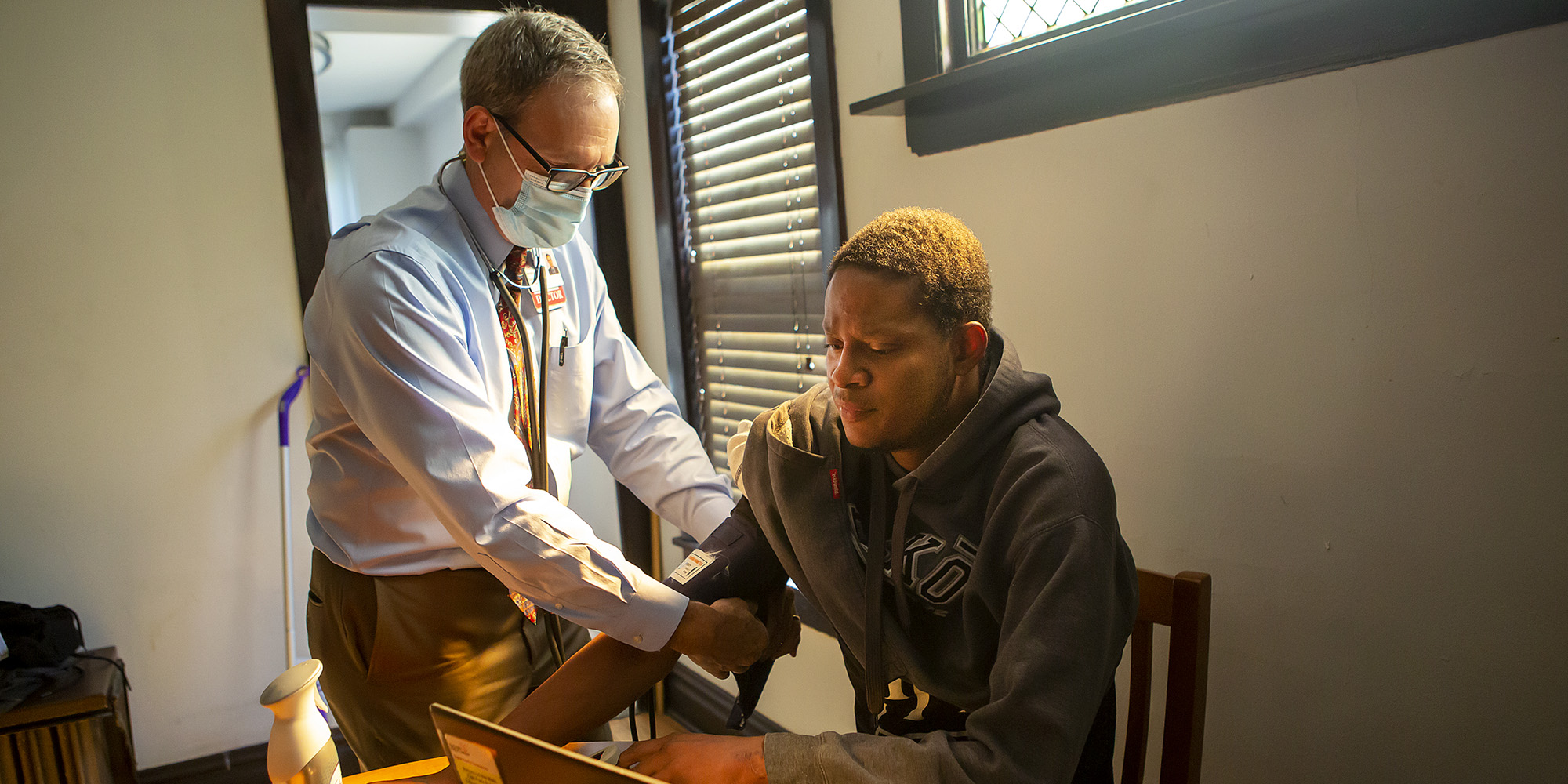New Facilities Increase Access at Sojourner House Medical Respite Program
January 25, 2023
Categories: MacNeal Hospital
Tags: MacNeal Hospital
MAYWOOD, IL – Since its opening in 2019, Sojourner House, a medical respite program in partnership with MacNeal Hospital and Housing Forward, has provided a safe place for patients experiencing homelessness to recover and heal. With the installation of lifts both inside and outside the house, Sojourner House is now able to more easily accommodate patients.
"Access has been a big issue for patients navigating in and out of the house," said Charles Bareis, MD, chief medical officer at MacNeal Hospital. "Patients with leg wounds, partial foot amputations, fractures, septic joints and heart failure have all had difficulty navigating both sets of stairs in the house. So this is a wonderful new development that will improve safety and ease of access for our patients at Sojourner House."
Without medical respite care, patients experiencing homelessness are often discharged back to the street, leaving them unable to fully recover due to the lack of stable housing. By offering a safe place for homeless patients to recover after hospital discharge, the Respite Program improves patient outcomes, reduces emergency department visits and hospital readmissions and connects patients with ongoing primary care. Once medically stabilized at Sojourner House, patients are transitioned to long-term supportive housing.
Prior to the founding of Sojourner House, medical respite programs existed in DuPage County and the city of Chicago, but not in suburban Cook County. Dr. Bareis recognized the gap in care for homeless patients following hospital discharge and worked with Housing Forward and the Oak Park housing authority to find options for patients in the communities MacNeal serves. The housing authority performed a significant renovation of a 105-year-old stucco home, and Sojourner House opened with individual apartments that allow patients to live independently as they recover.
Dr. Bareis remains heavily involved in the program and does weekly rounds with residents, helping coordinate their care along with Housing Forward's community nurse, Arletta Curtis. In addition to at-home medical care, including IVs, physical therapy and occupational therapy, the program provides food from Beyond Hunger and MacNeal's Food Surplus Program as well as nutritional counseling. Case managers work with patients to help them with medical appointments and preparations for life after Sojourner House, including finding suitable housing.
"What we hear from people mostly is, 'you saved my life.'" said Holly Rotman-Zaid, director of medical respite at Housing Forward. "We are able to not only give them a home, but offer them hope that life can still be lived."
Sojourner House resident Thomas credits the medical respite program and Dr. Bareis with giving him a second chance at life. After receiving severe injuries that required neurosurgery, Thomas has been able to rest and make a full recovery at Sojourner House. He has been housed in a Permanent Housing Program through Housing Forward that specifically assists clients with both substance abuse and mental health issues.
The staff at Housing Forward work hard to provide a community for the residents of Sojourner House, with holiday and birthday celebrations held in the common area of the house, which also hosts a sizable library of donated books. This sense of community helps create a stable foundation from which patients can move forward following recovery.
"We work hard at creating trauma-informed care," said Rotman-Zaid. "Patients come in with the trauma of being homeless and medical issues re-traumatize them. We try very much to accept people for where they are, work with them, and help lead them to where they can be proactive in their own life."
About Loyola Medicine
Loyola Medicine, a member of Trinity Health, is a nationally ranked academic, quaternary care system based in Chicago's western suburbs. The three-hospital system includes Loyola University Medical Center (LUMC), Gottlieb Memorial Hospital, MacNeal Hospital, as well as convenient locations offering primary care, specialty care and immediate care services from nearly 2,000 physicians throughout Cook, Will and DuPage counties. LUMC is a 547-licensed-bed hospital in Maywood that includes the William G. and Mary A. Ryan Center for Heart & Vascular Medicine, the Cardinal Bernardin Cancer Center, the John L. Keeley, MD, Emergency Department, a Level 1 trauma center, Illinois's largest burn center, the Nancy W. Knowles Orthopaedic Institute, a certified comprehensive stroke center, transplant center and a children’s hospital. Having delivered compassionate care for over 50 years, Loyola also trains the next generation of caregivers through its academic affiliation with Loyola University Chicago’s Stritch School of Medicine and Marcella Niehoff School of Nursing.
Established in 1961, Gottlieb Memorial Hospital is a 247-licensed-bed community hospital in Melrose Park that includes the Judd A. Weinberg Emergency Department, the Loyola Center for Metabolic Surgery and Bariatric Care, Loyola Cancer Care & Research at the Marjorie G. Weinberg Cancer Center, acute rehabilitation, a transitional care center, childcare center and fitness center. Founded in 1919, MacNeal Hospital is a 374-licensed-bed teaching hospital in Berwyn with advanced medical, surgical and psychiatric services and a 68-bed behavioral health program.
For more information, visit loyolamedicine.org. You can also follow Loyola Medicine on LinkedIn, Facebook, Instagram or X (formerly known as Twitter).
About Trinity Health
Trinity Health is one of the largest not-for-profit, faith-based health care systems in the nation. It is a family of 127,000 colleagues and more than 38,300 physicians and clinicians caring for diverse communities across 26 states. Nationally recognized for care and experience, the Trinity Health system includes 93 hospitals, 107 continuing care locations, the second largest PACE program in the country, 142 urgent care locations and many other health and well-being services. In fiscal year 2024, the Livonia, Michigan-based health system invested $1.3 billion in its communities in the form of charity care and other community benefit programs. For more information, visit us at www.trinity-health.org, or follow us on LinkedIn, Facebook, and X (formerly known as Twitter).
